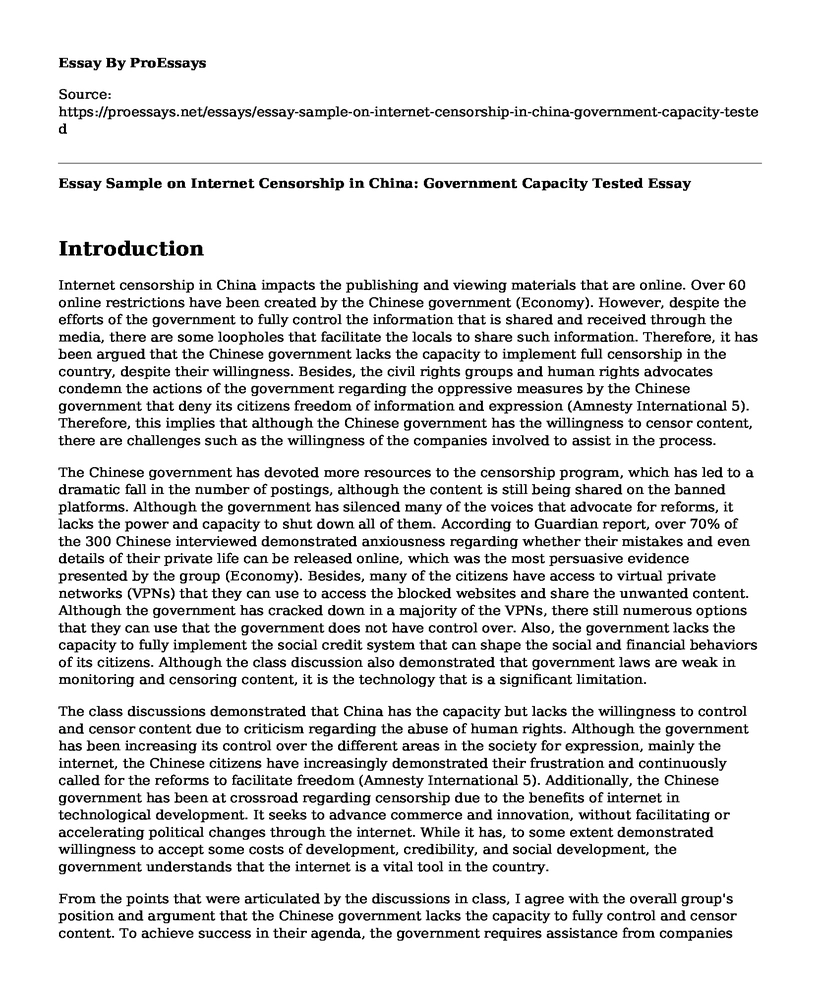Introduction
Internet censorship in China impacts the publishing and viewing materials that are online. Over 60 online restrictions have been created by the Chinese government (Economy). However, despite the efforts of the government to fully control the information that is shared and received through the media, there are some loopholes that facilitate the locals to share such information. Therefore, it has been argued that the Chinese government lacks the capacity to implement full censorship in the country, despite their willingness. Besides, the civil rights groups and human rights advocates condemn the actions of the government regarding the oppressive measures by the Chinese government that deny its citizens freedom of information and expression (Amnesty International 5). Therefore, this implies that although the Chinese government has the willingness to censor content, there are challenges such as the willingness of the companies involved to assist in the process.
The Chinese government has devoted more resources to the censorship program, which has led to a dramatic fall in the number of postings, although the content is still being shared on the banned platforms. Although the government has silenced many of the voices that advocate for reforms, it lacks the power and capacity to shut down all of them. According to Guardian report, over 70% of the 300 Chinese interviewed demonstrated anxiousness regarding whether their mistakes and even details of their private life can be released online, which was the most persuasive evidence presented by the group (Economy). Besides, many of the citizens have access to virtual private networks (VPNs) that they can use to access the blocked websites and share the unwanted content. Although the government has cracked down in a majority of the VPNs, there still numerous options that they can use that the government does not have control over. Also, the government lacks the capacity to fully implement the social credit system that can shape the social and financial behaviors of its citizens. Although the class discussion also demonstrated that government laws are weak in monitoring and censoring content, it is the technology that is a significant limitation.
The class discussions demonstrated that China has the capacity but lacks the willingness to control and censor content due to criticism regarding the abuse of human rights. Although the government has been increasing its control over the different areas in the society for expression, mainly the internet, the Chinese citizens have increasingly demonstrated their frustration and continuously called for the reforms to facilitate freedom (Amnesty International 5). Additionally, the Chinese government has been at crossroad regarding censorship due to the benefits of internet in technological development. It seeks to advance commerce and innovation, without facilitating or accelerating political changes through the internet. While it has, to some extent demonstrated willingness to accept some costs of development, credibility, and social development, the government understands that the internet is a vital tool in the country.
From the points that were articulated by the discussions in class, I agree with the overall group's position and argument that the Chinese government lacks the capacity to fully control and censor content. To achieve success in their agenda, the government requires assistance from companies that provide information as well as communication technology. However, some of the companies, such as Google have demonstrated unwillingness to show complacency to facilitate violations towards a repressive government. In this regard, it is adamantly a hard task for the government to fully control and censor media and internet, considering the numerous loopholes.
Works Cited
Amnesty International. Undermining freedom of expression in China. London: The Human Rights Action Center, 2006.
Economy, Elizabeth. The great firewall of China: Xi Jinping's internet showdown. The Guardian, 29th June 2018, www.theguardian.com/news/2018/jun/29/the-great-firewall-of-china-xi-jinpings-internet-shutdown. Accessed 20 November 2019.
Cite this page
Essay Sample on Internet Censorship in China: Government Capacity Tested. (2023, Mar 01). Retrieved from https://proessays.net/essays/essay-sample-on-internet-censorship-in-china-government-capacity-tested
If you are the original author of this essay and no longer wish to have it published on the ProEssays website, please click below to request its removal:
- What Is Architecture Essay Example
- Analysis of Speeches from Films
- Essay Sample on Health Legislation in the US
- Research Paper on Implications of Transnational Connections
- Essay on China's Economic Slowdown: Tighter Financial Regulations & Trade Wars
- Paper Example on Me Talk Pretty One Day: Analyzing Context, Purpose, Style, Tone, and What Can Be Learned
- Free Case Study Sample on Oil Platform Event: US Response to Iran's Attack in 1987-88







